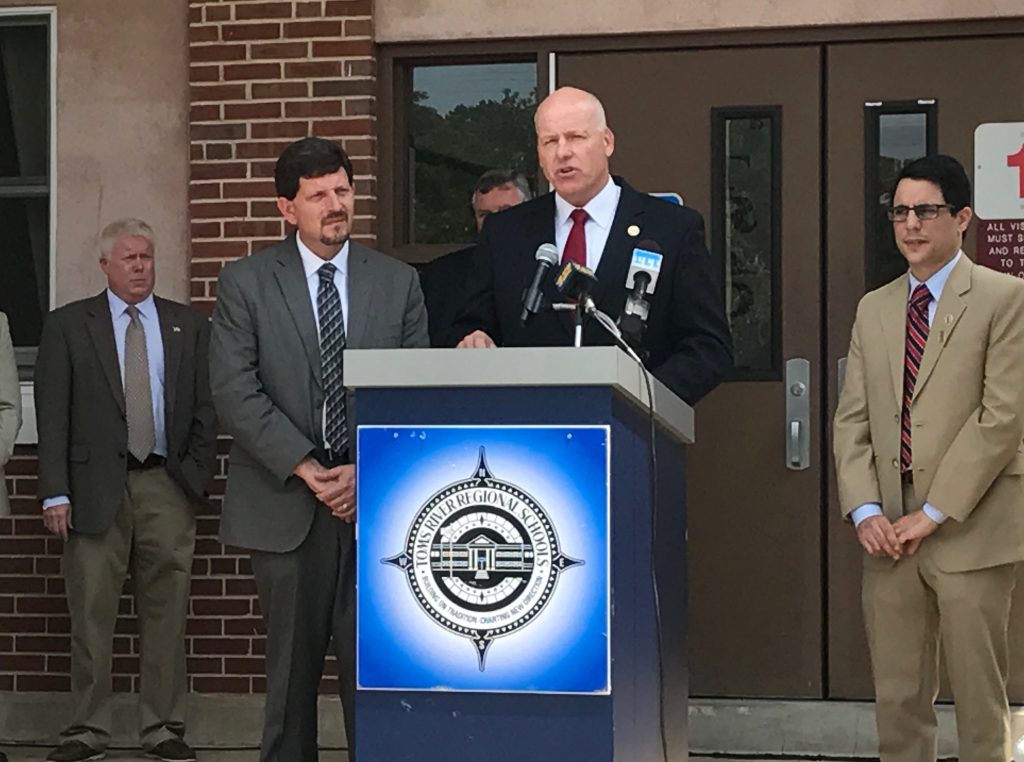
Superintendent David Healy speaks on school funding, June 21, 2017. (Photo: Daniel Nee)
The Toms River Regional Board of Education on Tuesday night granted Superintendent David M. Healy a contract extension through the 2021-22 school year and increases in base salary, but not before some residents, including a leader of the township’s teachers’ union, publicly opposed the move.
Healy, 56, of Middletown, was earning a maximum of $207,900, with merit bonuses, under a contract that was set to expire after the 2018-19 school year. Under the new contract, Healy will earn a $203,000 base salary for the current school year and the 2018-19 school year, then $207,060 for the 2019-20 school year, $211,201 for the 2020-21 school year and $215,425 for the 2021-22 school year. Merit bonuses will be given up in the final three years of the contract to make up for salary increases.
While the salary increase will maintain Healy’s status as one of New Jersey’s 25 highest-paid schools superintendents, the Board of Education could have increased his earnings up to $220,302 per year, since a statewide salary cap on superintendents expired earlier this year. If another salary cap should be enacted, the contract may be reopened to negotiations, the agreement states.
That same loophole – contractual language that allows negotiations to be reopened – if salary cap laws are changed, allowed the contract to be reconsidered now without having to satisfy the normal legal requirements of superintendent contract modifications. Because, technically, Healy was offered a new contract instead of an extension, there was no requirement for the school board to hold a mandatory public hearing on the matter and wait 30 days before holding a final vote. That move was widely criticized by members of the public who spoke at Tuesday’s meeting, including Andrea Vahey, the leader of the Toms River Education Association’s Action Committee.
“Why … is there such a rush to renew the contract when there is a year and-a-half of the contract left,” Vahey asked board members, also characterizing the new contract as “strapping” new board members elected earlier this month with a long-term superintendent agreement.
“Finding a loophole to circumvent the law doesn’t sound like “clean slate” transparency, but back-room politics,” she added, referring to the campaign banner of the current board majority.
The contract extension and raise represented a vote of confidence in Healy, who earlier this year faced an allegation of sexual harassment by a former employee. An investigation into the alleged incidents by Vincent Grasso, a former judge who is now an employee of the law firm that represents the school district, ended with a confidential report on the matter being delivered to board members in a closed-door meeting. Its contents was never released to the public, though board member Dan Leonard, toward the conclusion of the meeting, would say the investigation was “inconclusive.”
Because the confidential files surrounding the affirmative action complaint that referenced the alleged harassment leaked to the press, board member Leonard said Healy could have chosen to “walk away” from the district and file a lawsuit.
Board President Ben Giovine said negotiations were fair to taxpayers and such extensions are common in districts where superintendents were hired during the years the salary cap was in place.
Still, one resident said the township should have negotiated a lower salary, and included the three board members just elected in the discussion.
“Why does the superintendent of Toms River have to make more than the governor of New Jersey or the governor of California?” asked Jennifer Howe. “I don’t think a board that is not going to be here in January should be voting on something like this.”
The employment contract between the district and Healy also provides for 15 sick days, which can be carried over year-to-year and subject to a maximum payout of $15,000 upon retirement. It provides for 25 vacation days, with a maximum of 25 days being rolled over in any year throughout the length of the contract. The document, additionally, provides for five personal days, the reimbursement of travel expenses or, alternatively, a $400 per month vehicle allowance, plus a cell phone and computer provided by the district.
Christopher Raimann was the only board member to vote ‘no’ on the approval of the contract.


Police, Fire & Courts
Toms River Police Catch Well-Known Suspect Attempting to Burglarize Vehicles

Police, Fire & Courts
Fatal Toms River Hit-and-Run Results in Charges Against Local Man, 68

Police, Fire & Courts
Foursome Accused of Dismembering Body Following Murder of Toms River Man







